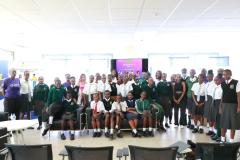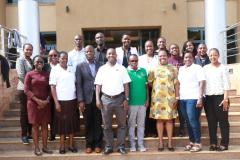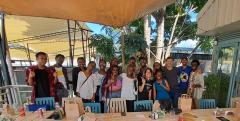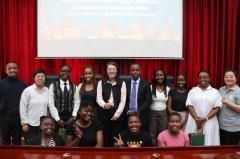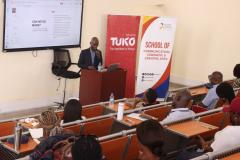VCs Weekly Higher Education Digest: March 18, 2019
Universities need to promote development through science By Eric Fredua-Kwarteng and Francis Ahia UNIVERSITY WORLD NEWS
The African Higher Education Summit held in Dakar, Senegal, on 10-12 March 2015 made a concerted effort to build a general consensus on what role Africa's universities should play in African development and society. The summit agreed on 10 principles, among them the promotion of world-class research and innovation; access, equity and accountability; institutional autonomy and academic freedom; and strengthening linkages to society, economy and employers. It remains a huge challenge as to how African universities’ leaders can translate those principles into plans, policies and programmes and implement them effectively.
https://www.universityworldnews.com/post.php?story=20190311092628883
‘Alternative Universities’ By Scott Jaschik INSIDE HIGHER EDUCATION
What if every college student had to major in three subjects, unrelated to one another? What if colleges built degrees around a series of global experiences? These are among the speculative considerations of Alternative Universities: Speculative Design for Innovation in Higher Education (Johns Hopkins University Press). The author of the book, David J. Staley, sets forth a series of possible models for higher education, not restricting himself to those immediately possible or practical.
Virtual exchanges promise study-abroad experience for the masses By Paul Basken TIMES HIGHER EDUCATION
US universities that seek the benefits of study-abroad programmes without the forbidding costs are increasingly turning to “virtual” foreign exchanges involving individual students and entire classrooms. Although the underlying idea is not new, improvements in technology and a growing recognition of the value of virtual exchanges have fuelled adoption across US campuses in just the past year or two.
https://www.timeshighereducation.com/news/virtual-exchanges-promise-study-abroad-experience-masses
A century on, IIE is still fighting ‘irrational nationalism’ By Mary Beth Marklein UNIVERSITY WORLD NEWS
This year, as Institute of International Education (IIE) celebrates its centennial anniversary, more than one million international students from across the globe are studying in US universities…. While the events of the past century have not produced lasting peace, IIE continues to make the case that international education can make the world a safer place…. Nevertheless, the campaign for peace through education continues to fight an uphill battle...
https://www.universityworldnews.com/post.php?story=20190314152632473
The problem with applying Western theories that don’t fit By Ted Sun UNIVERSITY WORLD NEWS
Globalisation challenges every individual to run faster and faster to keep pace with massive innovation across borders. In order to do that, the theoretical foundations of individuals must be strong and congruent to their core values. Unfortunately, most developing nations lack theories that are developed by their own scholars. In social sciences, using theories from other nations is like wearing shoes that don’t fit the individual or the purpose.
https://www.universityworldnews.com/post.php?story=20190312130941220
How to Bring ‘High-Impact Practices’ to Your Courses THE CHRONICLE OF HIGHER EDUCATION
The phrase "high-impact practices" is, by now, now pretty familiar…. HIPs, as they're called, take many forms. They're often associated with programs, like internships, learning communities, service learning, and study abroad. They're also identified with elements of the curriculum, like collaborative assignments and e-portfolios. At the AAC&U's annual meeting in January, Matthew Mayhew and several of his co-authors of How College Affects Students raised questions about the empirical evidence for HIPs.
https://www.chronicle.com/article/How-to-Bring-High-Impact/245836
Gold standard of PhD ‘under threat’, professors claim By Jack Grove TIMES HIGHER EDUCATION
Academics have provoked debate by claiming that increased pressure to pass substandard candidates, nepotism and the rise of the “PhD by prior publication” are endangering the doctorate’s reputation as the “gold standard” of academia. In a scathing critique of PhD practices worldwide, David Alexander and Ian Davis, from UCL and Oxford Brookes University, said that “corruption”, “negligence” and other failings “risk causing quality to be compromised”.
https://www.timeshighereducation.com/news/gold-standard-phd-under-threat-professors-claim
Why a Plagiarism-Detection Company Is Now a Billion-Dollar Business By Beth McMurtrie THE CHRONICLE OF HIGHER EDUCATION
Stamping out student plagiarism is big business. How big? $1.735 billion, to be exact. That’s the price that Advance, a privately held media, communications, and technology company, will pay to purchase Turnitin, the 800-pound gorilla of plagiarism-detection services. Although not the largest ed-tech deal ever made, it is, in the words of one analyst, “massive.”
https://www.chronicle.com/article/Why-a-Plagiarism-Detection/245832
Turnitin Authorship Investigate supporting academic integrity is released UNIVERSITY BUSINESS
Turnitin, a leading provider of feedback, grading, and plagiarism checking solutions, announced today the general availability of Authorship Investigate, the first solution that supports higher education administrators in addressing contract cheating. Authorship Investigate uses forensic linguistic analysis and Natural Language Processing to help investigators efficiently compare differences in written work and gather the evidence needed to investigate potential cases of contract cheating. Contract cheating is the practice of using a third party—a commercial essay mill, friend, or family member—to complete an assignment.
Do universities put too much weight on student evaluations of teaching? By Diane Peters UNIVERSITY AFFAIRS
In the ivory tower past, university professors taught and students learned – or did not learn, as the case may be. Bad teachers sometimes got flagged and were nudged out, but many got to keep droning away at the lectern until retirement. As the idea of student-centred learning emerged, students increasingly saw themselves as active participants in their education. They wanted an official say and SETs [student evaluation of teaching] offered a sanctioned means to share insights on the classroom experience…. research over the past decade or so has shown serious flaws with SETs…
The gender gap will take 108 years to close, says WEF By Jan Petter Myklebust UNIVERSITY WORLD NEWS
At the current rate of progress, the global gender gap will take 108 years to close and economic gender parity will take 202 years to achieve. That is the conclusion of the World Economic Forum’s (WEF) Global Gender Gap Report 2018, published in December. Yet closing that gap is vital if countries wish to be able to compete in the fast-changing world ahead.
https://www.universityworldnews.com/post.php?story=20190315083305277
Behind the silence and silencing of academic women By Sarah Jane Aiston UNIVERSITY WORLD NEWS
The underrepresentation of women academics in the most senior ranks and leadership positions in higher education is an enduring social justice issue. We would like to think that universities are at the forefront of demonstrating a commitment to diversity and inclusivity, but they remain ‘bastions of male power and prestige’ … Why women remain globally underrepresented as academic leaders is highly complex and multifaceted.
https://www.universityworldnews.com/post.php?story=20190314071633193
Warning over ‘biased results’ of industry-funded research By Rachael Pells TIMES HUGHER EDUCATION
European universities must be watchful that their increasing dependence on industry for research funding does not lead to “biased results” and the undermining of other “curiosity-driven” scholarship, a new report says. The caution is referenced in an extensive report undertaken by the European University Association, The Role of Universities in Regional Innovation Ecosystems…. Universities across Europe face increasing pressure to work more collaboratively with private companies in order to meet national research and economic goals.
Bribery Scandal Reveals ‘Weak Spots’ in the Admissions System. Don’t Look So Shocked By Eric Hoover THE CHRONICLE OF HIGHER EDUCATION
The Justice Department had just charged 50 people in an admissions-bribery scheme that got dozens of privileged applicants into big-name colleges over several years… In the relentless chase for status and prestige, some people will do anything to get their kids into elite colleges, throwing all their resources at a system that, in one way or another, so often rewards the wealthiest participants.
College Officials Were Charged in the Admissions-Bribery Scheme. Now Their Campuses Are Cutting Ties. By Terry Nguyen THE CHRONICLE OF HIGHER EDUCATION
Colleges moved quickly on Tuesday to distance themselves from coaches and other employees charged in the wake of an investigation into an admissions-bribery scheme that federal prosecutors announced that morning…. The cascading crisis-management response from officials at some of the nation’s most highly regarded universities tended to call attention to their institutions’ high ethical standards.
https://www.chronicle.com/article/College-Officials-Were-Charged/245865
College Admissions: Vulnerable, Exploitable, and to Many Americans, Broken By Anemona Hartocollis THE NEW YORK TIMES
Standardized test scores are manufactured. Transcripts are made up. High-stakes admissions decisions are issued based on fabricated extracurricular activities, ghostwritten personal essays and the size of the check written by the parents of the applicant. American universities are often cast as the envy of the world, august institutions that select the best and the brightest young people after an objective and rigorous selection process. But the bribery scandal… has shown the admissions system to be something else entirely: exploitable, arbitrary, broken.
https://www.nytimes.com/2019/03/15/us/college-admissions-problems.html?smid=nytcore-ios-share
How Parents Are Robbing Their Children of Adulthood By Claire Cain Miller and Jonah Engel Bromwich THE NEW YORK TIMES
Helicopter parenting, the practice of hovering anxiously near one’s children, monitoring their every activity, is so 20th century. Some affluent mothers and fathers now are more like snowplows: machines chugging ahead, clearing any obstacles in their child’s path to success, so they don’t have to encounter failure, frustration or lost opportunities.
https://www.nytimes.com/2019/03/16/style/snowplow-parenting-scandal.html?smid=nytcore-ios-share
‘What Does It Take?’: Admissions Scandal Is a Harsh Lesson in Racial Disparities By John Eligon and Audra D. S. Burch THE NEW YORK TIMES
With an expansive network of pricey college preparation courses and counselors at their disposal, wealthy students find themselves with a leg up in the increasingly cutthroat competition for the limited slots at the most prestigious universities. In an effort to diversify their student bodies, universities are recruiting students of different racial and economic backgrounds. But those opportunities can come with a backlash.
https://www.nytimes.com/2019/03/13/us/college-admissions-race.html?smid=nytcore-ios-share

